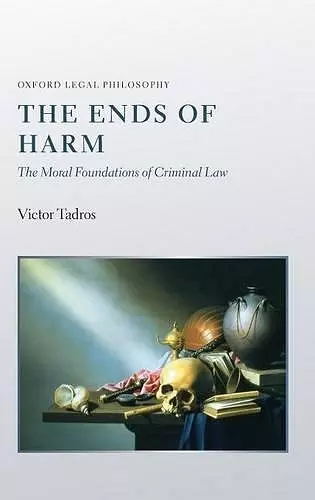The Ends of Harm
The Moral Foundations of Criminal Law
Format:Hardback
Publisher:Oxford University Press
Published:15th Sep '11
Currently unavailable, and unfortunately no date known when it will be back

Every modern democratic state imprisons thousands of offenders every year, depriving them of their liberty, causing them a great deal of psychological and sometimes physical harm. Relationships are destroyed, jobs are lost, the risk of the offender being harmed by other offenders is increased and all at great expense to the state. How can this brutal and costly enterprise be justified? Traditionally, philosophers answering this question have argued either that the punishment of wrongdoers is a good in itself (retributivism), or that it is a regrettable means to a valuable end, such as the deterrence of future wrongdoing, and thus justifiable on consequentialist grounds. This book offers a critical examination of those theories and advances a new argument for punishment's justification, calling it the 'duty view'. On this view, the permission to punish offenders is grounded in the duties that they incur in virtue of their wrongdoing. The most important duties that ground the justification of punishment are the duty to recognize that the offender has done wrong and the duty to protect others against wrongdoing. In the light of these duties the state has a permission to punish offenders to ensure that they recognize that what they have done is wrong, but also to protect others from crime. In contrast to other justifications of punishment grounded in deterrence, the duty view is developed in the light of a non-consequentialist moral theory: a theory which endorses constraints on the pursuit of the good. It is shown that it is normally wrong to harm a person as a means to pursue a greater good. However, there are exceptions to this principle in cases where the person harmed has an enforceable duty to pursue the good. The implications of this idea are explored both in the context of self-defence, and then in the context of punishment. Through the systematic exploration of the relationship between self-defence and punishment, the book makes significant progress in defending a plausible set of non-consequentialist moral principles that justify the punishment of wrongdoers, and marks a significant contribution to the philosophical literature on punishment.
Anyone who performs the seemingly impossible task of providing a plausible account of criminal punishment, especially a hybrid account that accommodates both deterrent and dentological intuitions, should be applauded ... I admire the ambition, the scope, and the ingenuity of Tadros's Duty and Theory of Punishment * Hamish Stewart, Criminal Law and Philosophy *
A stimulating, original and well-written account that prompts a reconsideration of the existing foundation of punishment. * Legal Studies, Vol 32 No 3 *
Tadros has put his agile, analytical mind to work to solve a problem that should be of central concern to all of us. And in that spirit, his work should be read and celebrated. * Ki mberly Kessler Ferzan, Jotwell *
If Tadros is right, philosophers of punishment must be moral and political philosophers too, and their philosophical horizons must expand accordingly. That it doubles as an attempt to meet this challenge makes ^iThe End of Harm^r an invigorating read. * James Edwards, Law Quarterly Review *
Victor Tadros has produced a powerful and highly original moral justification for a practice of state punishment that would be more purposeful and humane than any presently existing system of criminal punishment. He argues with great cogency that the permissibility of punishment and the permissibility of self-defense have their common source in the enforcement of duties that wrongdoers owe to their victims. In the course of meticulously defending these comprehensive accounts of the right to punish and the right of self-defense, he illuminates a range of central issues in normative ethics, political philosophy, and legal theory. The Ends of Harm presents a profound and brilliant challenge both to our institutions of punishment and to our traditional ways of justifying them. * Jeff McMahan, Rutgers University *
Victor Tadros is one of the brightest, most inventive theorists working on the morality of punishment, and his admirable insight and creativity are on full display in this very impressive book. * Professor Christopher Heath Wellman, Washington University in St Louis *
Tadros's new book makes striking and original contributions not only to penal theory, but to moral philosophy more broadly. Starting from a vivid reminder of just how morally problematic the practice of state punishment is, he develops an instrumentalist account of punishment as general deterrence, but does so on the basis of a firmly non-instrumentalist, Kantian moral theory to which the idea of respect for persons (along with the 'means principle' that forbids treating people as means) is central. The key new idea here is that those who commit crimes acquire duties to their victims, including the duty to protect them against future harm; this, Tadros argues, can then justify the imposition of deterrent punishments as a way of enforcing those protective duties. * Professor R. A. Duff, University of Stirling and University of Minnesota *
The book is rife with intriguing insights, original ideas but also new twists on old ones, and important and far-reaching arguments. Despite this wealth of content, however, Tadros keeps his eyes on the prize and the basic argument is precise, concise and admirably clearly developed. * Professor Emmanuel Melissaris, Jurisprudence *
ISBN: 9780199554423
Dimensions: 236mm x 163mm x 30mm
Weight: 754g
384 pages